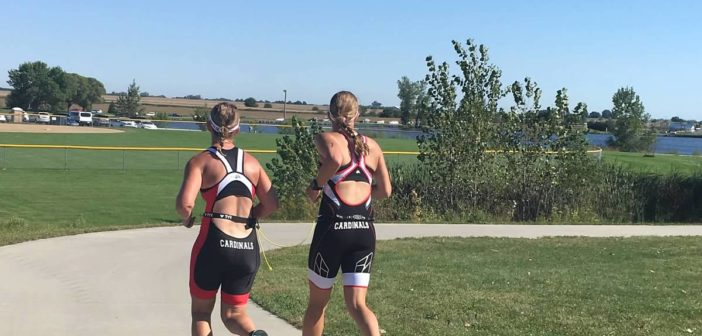The triathlon competition consists of three ordered events — swimming, biking and running — over a preset course for a timed finish. Widespread across the United States and the world, these contests are a unique test of physical fitness and mental toughness; the swim is 750 m, the biking 20 km and the run 5 km.
In recent years, the triathlon has gained ground in the collegiate scene, arriving at North Central’s door just this year with six athletes and a pair of coaches. Each of the athletes face a grueling challenge in the triathlon, but one in particular has an additional factor at play. Ashley Eisenmenger, a junior at NCC, has been competing in triathlons since her freshman year, and proven herself a capable, fierce competitor in the field. That additional factor? Ashley has been near completely blind since birth.
“I’m a triplet, and we were born premature; as a result of that early birth, I was left with very little sight.” Ashley’s vision impairment is not absolute, nor the typical thought of total darkness when imagining what exactly a blind person experiences. “I can’t see out of my right eye, but from my left eye I can see large objects and bright colors, as well as distinct opposing colors such as a black and bright white.”
As can be imagined, being born visually impaired brings unique differences in lifestyle, some of which being difficulties others may not experience. Despite these, Ashley never let her blindness become a central theme of her life; it was simply an accepted fact.
“There were definitely challenges looking back; I can pick out individual ones that occurred. However, as I was growing up, the norm was not having sight. While I knew things were more difficult for me than they were for others, it wasn’t something that I focused on. It was the way things were and how they were going to be.”
While the common childhood of recreational and competitive sports largely eluded Ashley’s life, she eventually found a passion that would prove beneficial later in her triathlon endeavors: running. Throughout her high school career, Ashley ran several 5Ks, 10Ks, and half marathons. Her triathlon history began the summer after graduation, when she met with a former triathlete who agreed to train with her. This same woman would also serve as Ashley’s guide during her race, a position that requires constant focus and communication, and is key to a blind athlete’s competition in the triathlon.
“I rely on people,” said Ashley on how she exactly she races. “I swim, bike and run with sighted guides. Their job is to give me cues, which can be a verbal communication or a hand on my shoulder, to ensure that I stay on the path and know what’s going on.”
Alongside the verbal or physical communication that the guides offer Ashley, she is also tethered to them by a bungee cord; this cord allows her to detect when she and her guide stray from one another and need to correct their path. Sighted guides allow Ashley to compete as though she were the same as other competitors; her times count in competition and while her pace can be hindered by the fitness of her guide, often she finds that their assistance is liberating.
“What’s unique about running, biking and swimming, is when I’m doing those things and I have a guide attached to me, I don’t feel like I’m blind. Their job is to take away the hindrance that my lack of vision would give me; they’re an equalizer,” said Ashley.
On the North Central team, Ashley is one of two upperclassmen competing in the Women’s Triathlon. Due to her position and experience competing, she’s looked to as a leader, and fulfills that role with constant encouragement and pep talks.
“Ashley comes to every practice, every workout, and remains positive throughout no matter what,” said Jen Hufnagle, a sophomore and teammate of Ashley’s.
While her athletic life details the exceptional side of her persona, beyond competition Ashley is a normal, friendly girl. Though she has adjusted her lifestyle to accommodate her blindness, she is adamantly against allowing it to define her.
“I am stubbornly independent. I try to do everything by myself until it fails and I need someone’s help.”
Since her childhood, growing up in a small town with a small school where her disability was well received and accepted by peers, Ashley has maintained her life as being quite similar to someone with sight. There are differences in certain aspects; she has specialized programs that allow her phone and computer to speak to her, she travels with a white cane and often utilizes sound when travelling, and she’s become fluent in reading braille. Her being blind isn’t something to shy away from, and she knows this, but it’s also not something she wants to be her sole characteristic.
“It is a physical disability, and I’m very aware of that and I accept it,” said Ashley. “However, I choose not to let the fact that I can’t see define me. When you look at me, I don’t want you to think of me as ‘the blind girl,’ I want you to think of me as ‘Ashley’.”
While it may seem awkward or uncomfortable, Hufnagle insists that Ashley is no different than any other student on campus, and as Ashley said, should be approached and looked at the same way.
“I think people feel awkward about approaching her or speaking to her, so they’ll ask someone else to ask her or just avoid her in general, but they shouldn’t,” said Hufnagle. “Ashley is an incredible person and very approachable; just talk to her like you would anyone else.”

